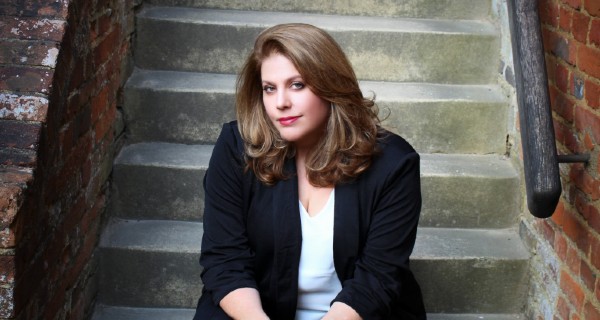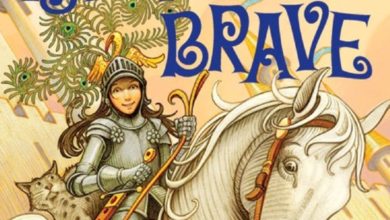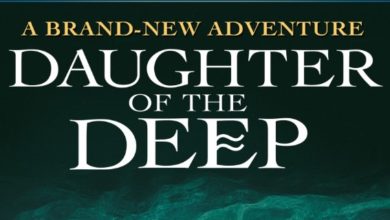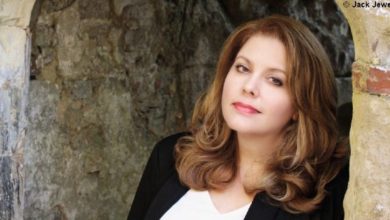
Hello and welcome to our conversation with YA and fantasy author Christi Daugherty. The conversation was held on December 30, 2020 over Zoom and continued for over an hour. That’s a very long read. For convenience of reading, we have decided to publish the conversation in thee parts. We talked about Daugherty’s career as a YA author, about her best-selling books, and about writing YA in general, and we had so much fun that an hour past in the blink of an eye! Be sure to join us for parts two and three.
Today we are very honored to have with us British author Christi Daugherty. For those of you who do not know, Daugherty is a former crime reporter and civil servant. She began writing “The Night School” series while working as a communications consultant for the Home Office. The young adult series went on to sell over a million-and-a-half copies worldwide. She later wrote “The Echo Killing” series, and “The Secret Fire” with French author Carina Rozenfeld. Her books have been translated into 25 languages, and have been bestsellers in multiple countries. In 2020 the books were optioned for television.
So, welcome Christi and thank you for joining us.
Thank you so much for having me. I’m really happy to be here. This is thrilling.
Great, so, let’s delve right in! First question: how did you become a YA writer?
It’s so funny, I always feel like most of the steps of my writing career have been a complete accident, and this was definitely one of those accidents. So, I became a journalist because I couldn’t think of anything to do for a living except write. I’m just not good at anything except writing. I am a catastrophic professional in everything else I’ve ever tried, and so that was an accident, but a good one.
I was a journalist for years, and then I became a freelance writer, by accident, because the newspaper I worked for shut down, so I sort of fell out of the daily newspaper. And then I became an editor by accident, because a friend offered me a job and I needed one, so I took it. I became a civil servant by accident, because the magazine I worked for shut down. This is a thing many writers will be familiar with. And then I found myself working for the British government—a job I never thought I would do. I was born in America, so for me it seemed I had come to a very strange place. I was working right in the middle of Westminster, I had meetings in Number 10 Downing Street. It was all very strange, and I do remember thinking, during those few years, “one of these days I should write a book, because I want to write about this world, but I can’t write about it non-fiction, because of rules,” so that was really the beginning of “Night School.”
I was surrounded by powerful people, and people who had grown up with great privilege, and I came from quite a not-privileged family in the Deep South in America, so to see this world as an outsider, that was the beginning. I had just read “Twilight” that had just sort of exploded, and I had read “The Hunger Games.” Initially I thought of writing about adults, but I’d read those books, and I thought, “what would it be like to be the teenage child of the people I was working with,” because this is a world their parents have invented, and they’re going to inherit it, and I remember the helplessness of being 16 during the Cold War. I remember basically thinking “my parents are ruining our world,” which I think a lot of young people think, and they’re not wrong sometimes. That was the beginning of that. I do love teenagers, but I did not set out to write YA. It just happened, as so many things happen, and then it turned out to be a good thing because I do really enjoy writing about young people.
So, your idea for becoming a YA author is let things roll…
I think so, yes. That is sort of how it worked. It definitely was not a thing I studied or planned for. It was more just an accident, a happy accident. Because most of my readers are not teenagers, most of my readers are in their 20s and 30s and older, and everybody feels like they have to apologize for reading books about young people, which I think is absurd. Would you apologize for reading Romeo and Juliet? Would you apologize for reading Catcher in the Rye? There’s no need to apologize. This is a world which, if it’s done well, they’re just interesting books about people. The age of the person in the book doesn’t matter.
How do you think your professional experience influenced your writing? I mean other than working at number 10 Downing Street, etc.
Yeah, probably quite a bit, because my first career was as a crime Reporter, and I got very close to a lot of crime scenes in America. I lived in Savannah Georgia at the time, and worked for a newspaper there, and crime reporters in America get very close to the crime scenes. It’s a pretty basic system. It’s a race to get to the crime scene before the police, so that you can see what happened, so that you can then write about it before they tape it off, and they can tell you nothing and you can’t see. So it is that environment where I encountered a lot of violence and wrote about a lot of violence.
I learned to write about death quite early, and to separate myself from it, while also observing. My job was to be the eyes and ears of the readers of my newspaper. All that probably nestled somewhere in my brain, someplace dark and dangerous, and then I went on with my life, read about other things, and then went to work for politicians. So all that plays into all of my books. “Night School” is about the children of powerful people and politicians. My new series Number 10 is about the daughter of the Prime Minister, who encounters a plot to kill her Mother, so I do find that murder, crime, and politics sort of play in some way into most of my books.
Do you think in some way your experience of actual crime gives your writing an extra level of authenticity?
Yeah, perhaps. I mean, I know I approach it from the perspective of wanting to be true to the damage it does. I read a lot of books that I find very frustrating, because they are not realistic about the impact of crime on the lives of those around the victims. and the criminals. Everybody around a crime is sucked into that world. They are all damaged by it. Everybody’s life is “less,” whether they knew the victim, they are families of the victim, or they know the criminal. Either way, you find yourself somehow tainted by proximity to that, and so, I want to be true to that. I want to be true to the ripples in the pond of life that crime causes, and that can lead to these waves that damage life. So that I’m very clear on that, and I often find crime novels gloss over that. They don’t capture it properly, so that does probably play into it.
And in terms of politics, I always want to humanize it. I find that often books about politicians and even evil politicians, make them sort of mustache-twirling cartoon characters, and in fact they are just people. They are human beings, and they have nuance. And one of the things I want people to take from my “Night School” books, and which I know some of them do take, is I want them to wonder whether my main characters are always the good guys, because in my mind they aren’t always the good guys. And I want them to think about whether the people they think of as the bad guys are always really the bad guys. Look at the nuance of that, who is right and who is wrong – It’s up to the person who is reading the book.
Your first books became sort of an overnight hit. Did the success of your first book, or your first book-serie,s put pressure on you to meet expectations?
You know, it’s funny. At the time, I was just, you know, riding that rollercoaster, so I don’t think I noticed as much. I know I was under pressure to produce books very quickly, so I was always editing one Book, and promoting another book, and writing a third book, simultaneously. I had to quit my day job because I simply couldn’t keep up with all of that and work. It wasn’t something I wanted to do, I had to do it. And then, after “Night School,” there was a “what is she going to do next” thing, and that’s one reason I ended up writing “The Secret Fire” with Carina Rozenfeld.
We started writing that series while I was still working on Night School: End Game, so it gave me something I knew I could step into next. It was like “Night School” in that it was character driven YA, but it was different because it was fantasy, and I’ve never written fantasy before. Also, I was working with another author. So, it was just like doing something new without going too far from my sort of comfort zone.
We’re going back to this subject, but for the time being, I want to ask you, who are your main sources of inspiration?
It’s funny, I think… There were definitely books… I mean, reading “Twilight,” even though I know there’s been a lot of revisionist thought on it, but just looking at the series for what it was at the time, the phenomenon of it… At first I was like everybody else my age – “I’m not going to read this book! This is a book for children, and it’s ridiculous that anybody… Why is everybody reading this book? What if this book is really good? Maybe I’ll just read it when nobody’s listening…” That was my sort of journey.
So, I bought the book, and I read it in secret, like many people did, and I read it in about a day. And only when I finished it I thought, “I’m not sure I liked that book, but it’s been a very long time since I read a book that quickly, and just sort of absorbed it, like food, like it was just like water.” I spent a long time thinking about why that was, and I think that it was just a page turner, and I had taken to reading different kinds of books, books that were recommended to me by important newspapers and friends who read important newspapers. It had been a long time since I read a book just for the sheer joy of it – just felt the joy of reading and the story.
The Hunger Games was the same. I read The Hunger Games on a plane flying to America to see my family, and I read the first book on the plane, and it was a 14-hour flight. By the time the plane landed I finished it, and my brother (who I hadn’t seen in like a year and a half) met me at the airport. He gave me a hug and I got in the car, and I said “take me to your bookstore. I need to buy the second book in the series. Just stop at any bookstore on the way home.” It was that much of a of an addiction. Those books really influenced my desire to write addictive books, if that’s a thing, if that’s a subcategory like thrillers – page turners, character driven stories. That really influenced me.
Other things that influenced me were primarily movies and television. When I’m stuck in my writing, it’s often TV series I go to. “Buffy the Vampire Slayer” has fantastic dialogue – very fast, very funny, very dark. It’s also helpful for my non-fantasy books, because it’s not about the vampires. It’s about the conversation, and how that builds character. That’s really important to me. I often build characters through dialogue. There is also a series from America called “My So-Called Life,” which came out in the 90s. I have a boxed set, and when I need to remember what it’s like to be a teenager, I just put that on for an hour, and I just watch a couple of episodes to be reminded of that world. Because even though I write in it, and I kind of live in it, I can forget, and we all forget, and I don’t think it’s the same, observing your own children, if you have teenage children. It’s different to watch what another artist has done with teenage life. And that, to me, is what I get a lot from television. I find different influences from books and television.
You said that you wanted to write addictive books, that it’s what you set out to do. How do you set out to write an addictive book?
Well indeed. That’s the hard part. Saying and doing are two different things. I completely agree. I had a fantastic editor when I first sold “Night School” in Britain – Sam Smith at Little Brown, who had a huge experience in this field. She was the British editor of “Twilight.” She knew very much what I was talking about, so she taught me a lot about how you approach it, and some of that is through chapter endings. Where you end chapters really matters. And if you look at where the chapters end in the first “Night School” book, and where they end in the third “Night School” book, you can see there is an evolution of learning. My chapters in the first “Night School” are quite long and they end in really satisfying places for me. Like, “that is the end of this chapter.” It’s a technical thing, but that is part of it, in that if you put chapter endings in very smart places, people want to turn the page and keep reading. That, for example, is a technical way to write a more addictive book. Make sure you end on a cliffhanger, or instead of at the end of a scene, in the middle of a scene, but in a satisfying place.
These are sort of ways to make sure the pages keep turning. And the rest of it, for me, is about balancing really carefully, building characters people believe in and love, so they feel real to them. That makes them have impact on readers. You want to have an impact on readers, so that they feel like if something happens to these characters it happens to them. It’s a very cathartic relationship, and if you can create an emotional connection between reader and character, then people get more invested in the books. I do this because when I’m reading, this is what I want to read. And if I can’t feel a character when I’m reading, I quickly lose interest in the book.
Another method is place. So, set the story in a place where people want to spend time. I created a school – Cimmeria Academy in “Night School,” where it’s just a little bit real and a little bit fantasy, in terms of how perfect and sprawling it is, and what it looks like. I tried to make sure people can see this building that’s almost impossibly perfect. To that end, I went to a lot of boarding schools—l didn’t attend them, but I visited. Personally, I went to a school across the street from a muffler shop in Houston TX—so to me any British boarding school is a fantasy setting. These schools really do look like castles. In fact, some of them are mansion Castle houses. It’s extraordinary, and so this sort of setting to me was fantastic. If I could convey that in my writing, then people want to spend time there. They want to see it. It’s a place they want to linger, it’s a place I, as a writer, want to hang out in. So, if they want to stay in your setting, if they want to be with your characters, and if everything is constantly hitting the fan in terms of the plot, then there you have the formula, really, for a book people don’t want to put down, hopefully.
You mentioned boarding houses… So, what’s the deal with British people and boarding schools? Seems like a very repeating theme in many books and books series, especially for YA.
Yes, it really is, and for younger books. I mean, I remember reading books set in boarding schools when I was a child, all British boarding schools. I read a book called Charlotte Sometimes, that is one of my favorite books of all time. If you haven’t read it – read it. It’s one of those books about a young person, but adults can happily lose themselves in it. And there were other books. There are scenes in The Lion, the Witch and the Wardrobe, when they go away to school. It was such a thing that British kids went away to school. I think for young people there’s a kind of delightful terror in the idea of living away from their parents. Like having the idea of more freedom. I mean, personally, I would have loved to have gone to boarding school. Loved it! Even though I know it wouldn’t have lived up to my idea of what it would be like, and I know loads of people who’ve been to boarding school in real life, who are like “oh, why would you want to do that,” but if you haven’t done it, there’s something magical about it.
In America, we all go away to camp every summer, and we’re away from our parents. It’s the closest equivalent that you would find to that, if you are not particularly wealthy. And those weeks spent at summer camp, away from my parents – looking back, as an adult, were magical. I grew up a lot in those weeks. It was a kind of controlled freedom, really, if that makes sense. For me it was just this new world. I think there’s that element, we all invest in our own fantasies of the kind of freedom it would bring. I mean 200 kids and 20 adults, in a house. That’s the idea of young people being able to do things on their own, to have freedom to explore, to grow up. I suppose that’s it more than anything, and also the history of it. The history fictionalized boarding schools – such good books came out of it in the early 20th century, and we all grew up with those. We all have that bedrock on which we build a “boarding school fantasy.” We already kind of know it and idealize it, so it is kind of easy to then sort of slip into that world as a writer.
You mentioned that you yourself didn’t go to boarding school. So, what Kind of research did you have to do in order to write about life in such a school?
It’s funny, when I was working for the government, I did work with quite a few people who went to boarding school, so I could sort of pick their minds about what it was like for them. So, I had the actual people with their own experiences. I remember one of my press agents, when I was working with Little Brown, had gone to boarding school, and she told me that in hers they had ponies. They could all go ride their ponies after class, so they would go down from class, and she described these idyllic country Estates where they would have class in this old school building. Then they’d run down the Hill to where the horses were kept, and they’d all go riding on their horses across the fields. I mean, my goodness, what a way to go to school.
I have also spoken at boarding schools where you pass the students’ horses on the mile and a half private drive up to the main building. It’s crazy. There is very little in “Night School” that is entirely out of the realm of possibility. There are elements that I’ve invented to make it feel more magical, but none of them would be impossible with a little ingenuity, so yeah, I suppose that my research was talking to people who went to boarding school, then physically going to them to do speeches and meet the kids there, and talk about reading, and at the same time just absorb it, what it’s like. At one boarding school I spoke at, I was talked to a teacher for a while, who is actually a housemother, so she slept in the dorm with the students and kept an eye on them. She said some of the students, when they came there, were so protected by their parents, that she caught a student trying to open a tin of tomatoes with a knife because she didn’t know what a tin opener was. She didn’t have a can opener, and she had never seen one. She said they have to explain everything: “This is how you wash a dish, this is how you make a cup of tea,” because they children always had staff to do that for them.” Part of what they did at this boarding school was to teach very wealthy children how to live on their own. So yeah, that world is real.
What kind of more fantastical elements did you invent for Night School?
Things like night tennis and night Cricket, where everything lights up and the students play in the dark with glowing tennis rackets and glowing tennis balls, and they have a glowing net, but otherwise everything else is completely dark. That’s just something I’d like to do. I’m not sure if you could do it, but I have an umbrella that I bought somewhere that has lights all around the outside of it, so when you walk through the dark, if you push a button, the whole umbrella lights up like something out of a circus. So, there’s nothing you couldn’t do. That probably influenced my invention of the night tennis: if I could have an umbrella that lights up, I could have a tennis racket that lights up, and the same with cricket. But the rest of it, like the castle ruins at the top of the Hill, which people might think of as fantasy, that absolutely happens. That’s a thing you will actually find, and the Chapel on the grounds and a manor house, again, that’s completely routine. Cimmeria Academy is basically based on a boarding school near where I live. It’s almost identical to that particular school, it’s all real.
End of part 1
Be sure to join us for parts 2 and 3, where we really get into the meat of things!




